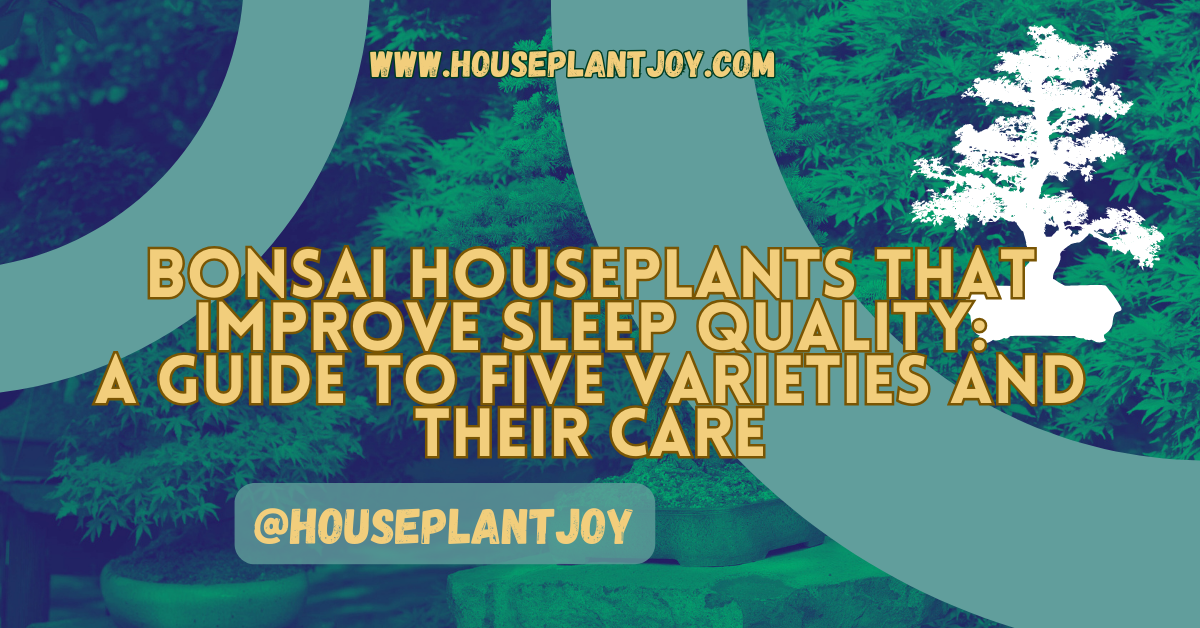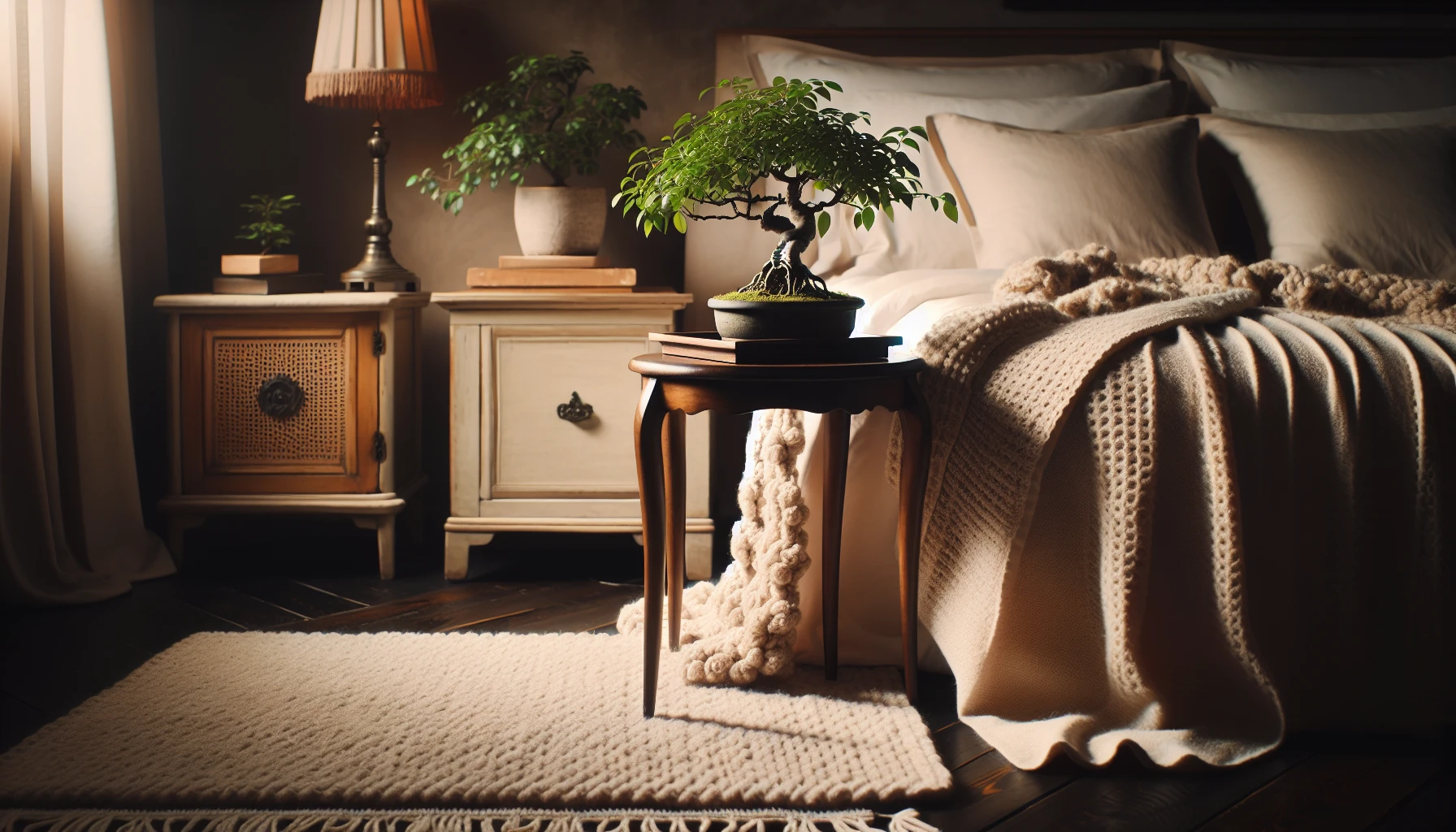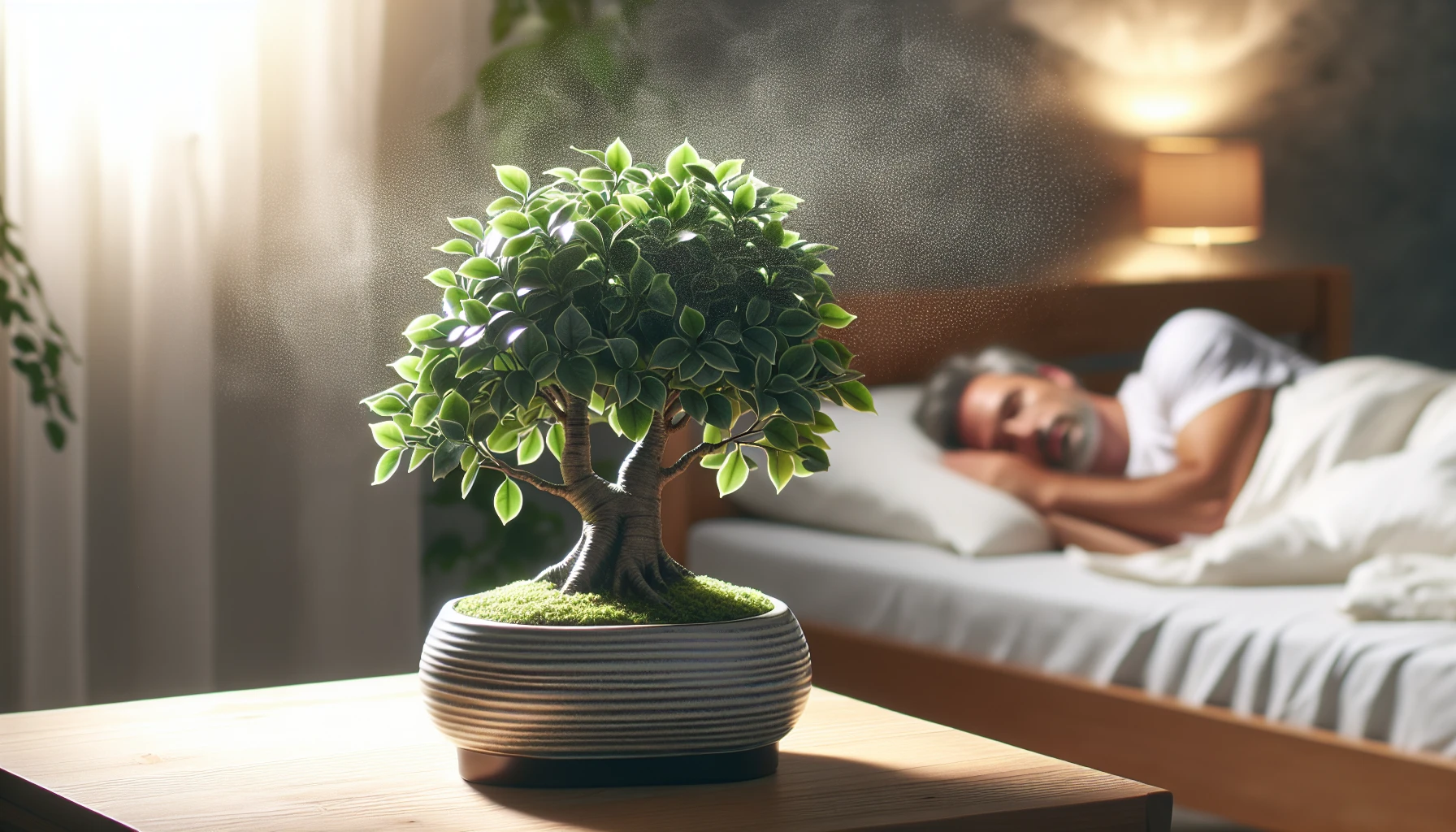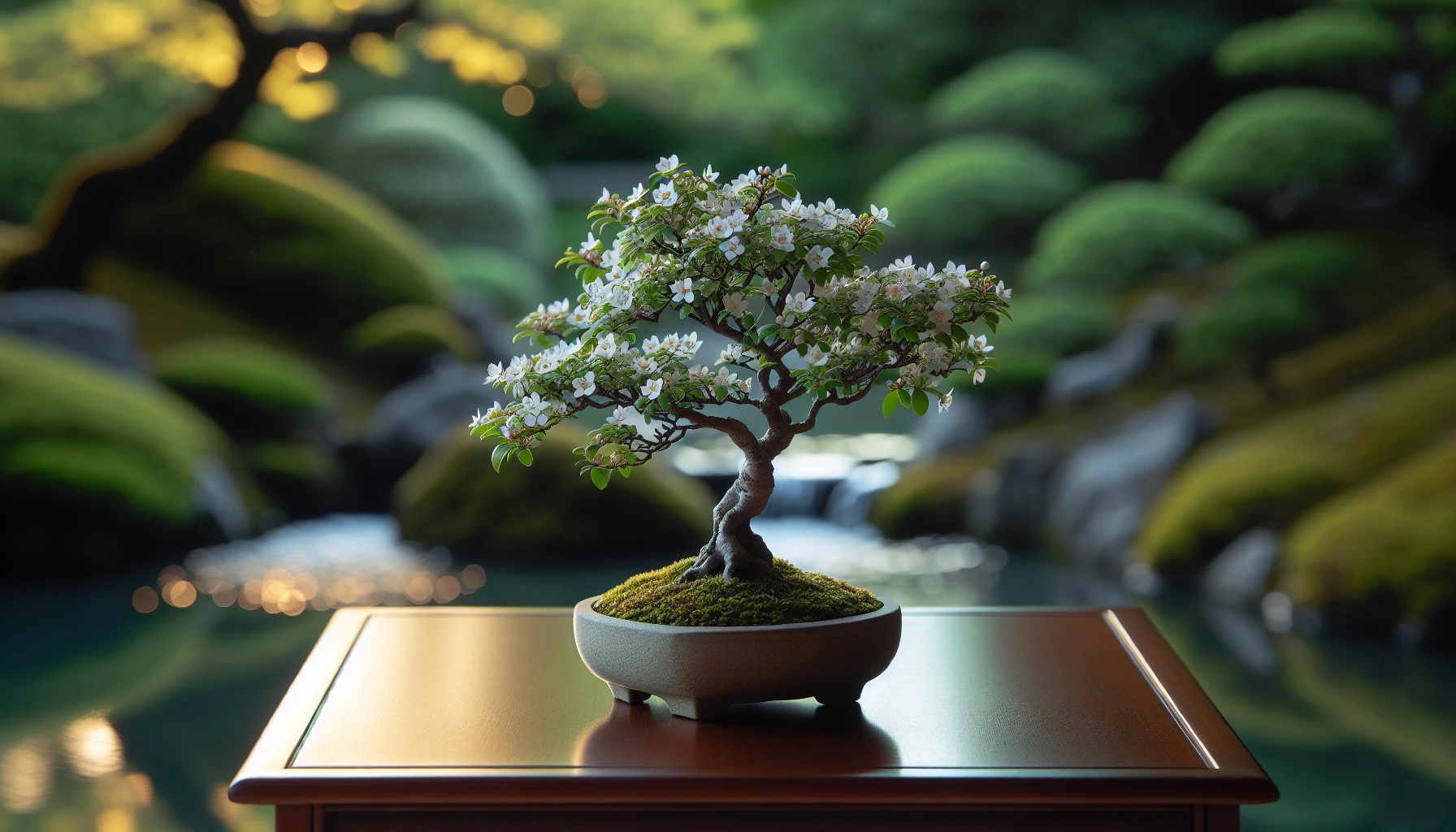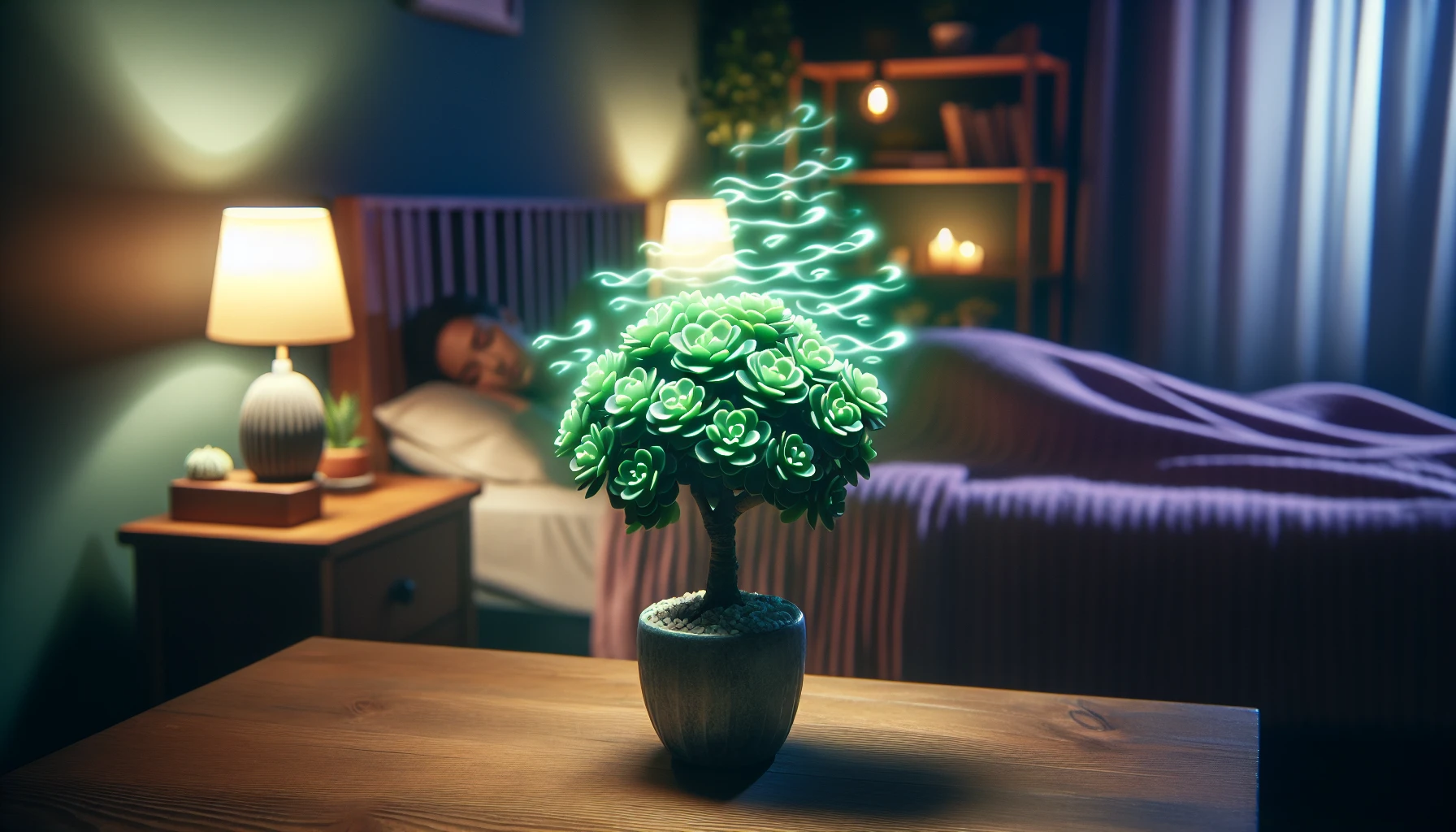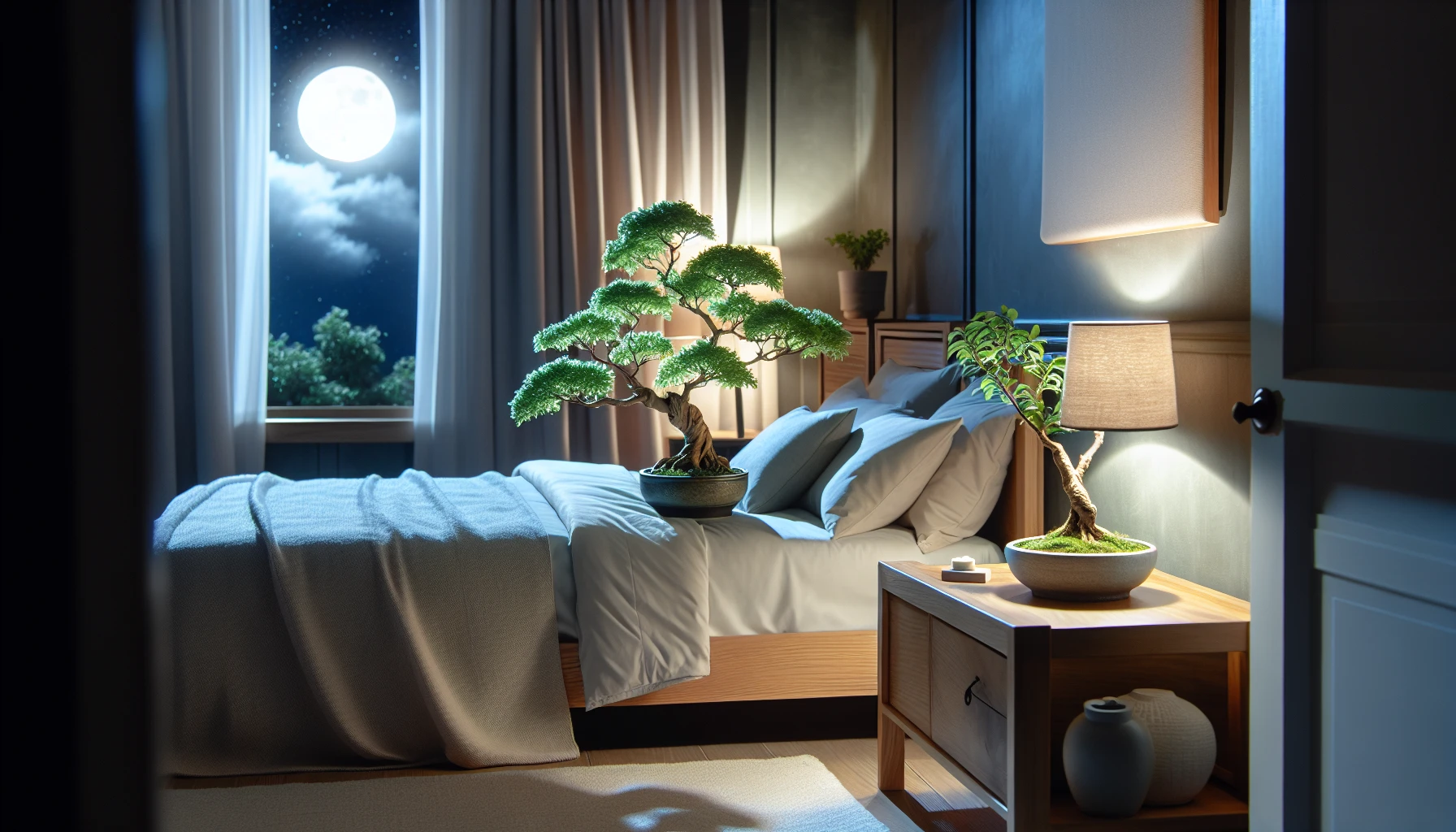HousePlantJoy is supported by our audience. When you purchase through one of our links, we may earn a small affiliate commission. As an Amazon Associate I earn from qualifying purchases. Your cost is not affected.
==================
Imagine a peaceful night’s sleep, surrounded by beautiful, living art that not only enhances your home’s ambiance but also contributes to better rest. Bonsai houseplants that improve sleep quality can do just that! In this blog post, we will explore five exceptional bonsai houseplants that can improve sleep quality while adding a touch of elegance and serenity to your living space.
Key Takeaways
- Ficus Bonsai is the perfect sleep-enhancing indoor bonsai tree, offering air purification and stress relief.
- Serissa Japonica (Snow Rose) Bonsai promotes relaxation with its aesthetic beauty & pruning techniques for improved sleep quality.
- Jade (Crassula) Bonsai is a low maintenance succulent that not only enhances sleep but also purifies the air.
Ficus Bonsai: The Sleep-Enhancing Plant
Ficus Bonsai, a remarkable sleep-enhancing indoor bonsai tree, thrives indoors and is perfect for beginners. This attractive plant has numerous advantages, such as air purification and stress relief, making it one of the best indoor plants alongside the spider plant. With care requirements similar to other indoor plants and indoor trees, Ficus Bonsai is surprisingly low-maintenance, making it a splendid choice for bonsai novices.
Ficus Bonsai not only cleanses the air by removing formaldehyde and other volatile organic compounds (VOCs), akin to the rubber plant, but it also enhances sleep quality by diminishing stress and fostering creativity. With all these benefits, it’s no wonder Ficus Bonsai is considered one of the best bedroom plants.
Caring for Ficus Bonsai
Ficus Bonsai thrives in bright, indirect sunlight, making it an ideal choice for indoor environments. Make sure your plant gets plenty of sunlight, but avoid harsh, direct rays that could potentially harm it. Regular watering to keep the soil moist, but not drenched, is key to maintaining its health and growth.
Ficus Bonsai thrives best in the following conditions:
- Daytime temperature range of 65°F to 75°F (18°C – 24°C)
- Stable temperature and humidity levels
- Soil with good drainage to avoid waterlogging and promote robust growth.
Benefits of Ficus Bonsai
Ficus Bonsai, one of the most effective air purifying plants, excels as an air purifier, helping to improve air quality by releasing oxygen through photosynthesis and reducing carbon dioxide. This remarkable plant can provide numerous health benefits, including:
- Increased concentration
- Improved sleep quality
- Reduced fatigue
- Increased happiness due to increased oxygen levels
Beyond its air-purifying capabilities, the mere sight of Ficus Bonsai aids in lowering stress levels and fostering relaxation. Creating a serene and peaceful bedroom atmosphere with Ficus Bonsai can lead to more restful sleep, thus enhancing your overall well-being.
Serissa Japonica (Snow Rose) Bonsai: A Delicate Beauty that Promotes Relaxation
Serissa Japonica Bonsai, also known as Snow Rose Bonsai, is a stunning and delicate plant that can help you relax and enjoy a restful sleep. With its beautiful blooms and intricate branches, this bonsai is a true work of art. While it necessitates more care compared to other bonsai varieties such as Ficus Bonsai, its unique benefits have made it a beloved choice among bonsai enthusiasts.
When tending to Serissa Japonica Bonsai, here are some important tips:
- Use lime-free water with a neutral pH (7) for watering to provide optimal growing conditions.
- This beautiful plant thrives best in temperatures above 50°F (10°C) during the growing season.
- It prefers a well-draining bonsai mix that is rich in organic matter.
Caring for Serissa Japonica Bonsai
To ensure optimal growth, place your Serissa Japonica Bonsai in a sunny, wind-protected area outdoors during the growing season, as long as the night temperatures remain stable. This bonsai can handle full sun, but morning or dappled sun is also suitable.
Watering plays a vital role in this plant’s health. Here are some tips for watering Serissa Japonica Bonsai:
- Check the soil and water when it starts to dry out.
- Use lime-free water with a neutral pH (7) for watering.
- The best soil for Serissa Japonica Bonsai is a well-draining bonsai mix rich in organic matter.
- This type of soil provides sufficient moisture retention and avoids waterlogging.
You can prune and shape at any time to achieve the desired form, as Serissa Bonsai tolerates hard pruning well.
Benefits of Serissa Japonica Bonsai
Keeping a Serissa Japonica Bonsai in the bedroom can promote relaxation and enhance the quality of sleep. The plant’s specific relaxation benefits are incredibly uplifting, helping to reduce stress and promote a sense of peace and relaxation.
One study found that viewing bonsai, including Serissa Japonica, can decrease prefrontal cortex activity and increase parasympathetic nervous activity, leading to a more relaxed state conducive to sleep. Another study also showed positive effects on autonomic nervous activity and subjective sleep quality.
Serissa Japonica Bonsai holds promising therapeutic benefits, with pruning and shaping techniques offering relaxation and stress relief, coupled with the aesthetic pleasure of its delicate flowers and intricate bark.
Jade (Crassula) Bonsai: The Succulent that Purifies Air
Jade Bonsai, also known as Crassula Bonsai, is a succulent that:
- Cleans the air
- Aids in enhancing sleep
- Requires minimal care
- Is ideal for bonsai novices or anyone seeking a low-maintenance plant to enhance their sleep environment
- Is particularly effective at removing toluene from the air
This beautiful shrub-like bonsai tree has a thick trunk and lush leaves, making it a visually appealing addition to any room. Its hardiness and cold tolerance also ensure its ability to thrive under various indoor conditions.
Caring for Jade Bonsai
Jade Bonsai flourishes with a daily dose of 4 to 6 hours of sunlight. Make sure your plant gets plenty of sunlight, but avoid harsh, direct sunlight that could potentially harm it. For its health and growth, sparingly water the plant and place it in a pot with good drainage.
Jade Bonsai thrives best in the following conditions:
- Daytime temperature range of 50-75 degrees Fahrenheit (10-24 degrees Celsius)
- Stable temperature and humidity levels
- Soil specifically designed for cacti and succulents
Benefits of Jade Bonsai
Jade Bonsai is a remarkable stress reducer, thanks to its calming influence on the mind and body. Research has shown that viewing green plants, like Jade Bonsai, can effectively lower stress levels. Moreover, Jade Bonsai plants can help purify the air, promote positive feng shui, and enhance sleep quality, all of which contribute to stress reduction.
Creating a serene and peaceful bedroom atmosphere with Jade Bonsai can lead to more restful sleep, thus enhancing your overall well-being. Its air-purifying properties and ability to increase oxygen levels in the air make it an ideal plant for those seeking better sleep and a healthier living environment.
Chinese Elm Bonsai: A Classic Tree for Better Sleep
Chinese Elm Bonsai, with its beautiful appearance and multifaceted benefits, is a classic tree that can boost sleep quality. This bonsai tree offers the following advantages:
- Easy to care for, making it a perfect fit for both beginners and experienced enthusiasts
- Impressive longevity, ensuring years of enjoyment
- Stunning beauty, adding a touch of elegance to any space
- Moderate ease of care, requiring minimal effort to maintain
These qualities make Chinese Elm Bonsai a favorite among bonsai enthusiasts.
Chinese Elm Bonsai offers several benefits for your sleep environment:
- It refreshes the room and elevates oxygen levels.
- It fosters a tranquil and serene environment conducive to better sleep.
- The bonsai tree’s need for a balance of light and shade contributes to a calming atmosphere, enhancing relaxation and sleep quality.
Caring for Chinese Elm Bonsai
For optimal growth, position your Chinese Elm Bonsai in a location that receives bright, indirect light. Shield it from direct, intense sunlight, particularly on hot summer days, to avoid damage to the roots and maintain vibrant leaves. Regularly water it when the top layer of soil feels dry, allowing the soil to partially dry between watering to support healthy and robust growth.
For optimal growth and water drainage, a well-draining soil mix with 60% inorganic material and 40% organic material is recommended for a Chinese Elm Bonsai. This bonsai tree prefers a daytime temperature range of 65°F to 75°F (18°C – 24°C), and slightly cooler temperatures at night and in the winter.
Benefits of Chinese Elm Bonsai
Chinese Elm Bonsai trees are recognized for their positive contribution to indoor air quality. Although they may not cleanse the air on a grand scale like some other plants, they still positively impact air quality. Beyond its air-enhancing qualities, Chinese Elm Bonsai aids in reducing stress levels and promoting relaxation.
Engaging with plants, including bonsai trees, can help people recover from mental fatigue, uplift mood, and boost concentration. It’s also been found that viewing bonsai trees decreases prefrontal cortex activity, increases parasympathetic nervous activity, and induces feelings of comfort and relaxation.
Introducing a Chinese Elm Bonsai into your home can offer benefits such as improved air quality, reduced stress, and enhanced sleep.
Azalea Bonsai: The Flowering Plant that Calms the Mind
Azalea Bonsai, a flowering plant, soothes the mind and aids in improving sleep. With its bright flowers and complex branches, this bonsai plant, a true work of art, brings an element of elegance and tranquility to any living space. With moderate care requirements, Azalea Bonsai, offering unique benefits, is a favored choice among bonsai enthusiasts.
Azalea Bonsai has several benefits:
- Soothes the mind and enhances sleep
- Naturally purifies the air, improving indoor air quality
- Symbolizes feminine beauty, gentleness, and vulnerability
- Adorned with large flowers that last several weeks, creating a truly magnificent sight.
Caring for Azalea Bonsai
Azalea Bonsai enjoys bright, indirect light and thrives in such conditions. For optimal growth, shield it from direct, intense sunlight, particularly on hot summer days, to avoid damage to the roots and maintain vibrant flowers. Regularly water the plant to keep the soil moist and well-nourished.
For Azalea Bonsai, a mix of compost, fine pine bark, and mule mix or turface is ideal as it ensures excellent drainage and aeration. During the growing season, prune the plant in the spring once the flowers have fully bloomed to maintain its shape and size.
Benefits of Azalea Bonsai
Azalea Bonsai can promote peace of mind, cleanse the air, and improve sleep quality. Its soothing influence can help reduce stress and anxiety, and its air-purifying qualities enhance indoor air quality.
Pruning and shaping an Azalea Bonsai can serve as a dynamic form of meditation, encouraging mindfulness and instilling serenity in the mind. The plant’s bright flowers and complex branches add visual appeal to any room, creating a calming atmosphere conducive to improved sleep quality.
Summary
In conclusion, bonsai houseplants offer an excellent solution for those seeking to improve their sleep quality while adding beauty and serenity to their living spaces. Ficus Bonsai, Serissa Japonica, Jade Bonsai, Chinese Elm Bonsai, and Azalea Bonsai all provide unique benefits, including air purification, stress reduction, and a calming effect on the mind. By introducing these magnificent plants into your home, you can create a tranquil atmosphere that promotes better sleep and overall well-being.
Frequently Asked Questions
Which indoor plant is good for sleep?
Adding a few air purifying plants to your bedroom can help you create a peaceful environment for a restful sleep. Try snake plant, pothos, peace lily, Chinese evergreen, and ZZ plant to achieve the best results.
Is it good to have a bonsai in your bedroom?
Having a bonsai in your bedroom can bring a sense of tranquillity and balance while making a stylish décor statement. Its delicate leaves and calming look make it the perfect addition for any space.
Do bonsai trees improve air quality?
Bonsai trees improve air quality by releasing oxygen as part of photosynthesis, which brings several human health benefits such as improved concentration, reduced fatigue, and even increased happiness.
Are bonsai trees good for mental health?
Bonsai can have a positive effect on your mood, making them great for mental health. Working with bonsais has been reported to lift the spirits of more than 90% of enthusiasts who took part in a survey.
Which bonsai houseplant is the easiest to care for?
Jade Bonsai is the perfect choice for those looking for an easy to care for bonsai houseplant, requiring minimal maintenance and making it ideal for beginners.
Connect with Serenity: Explore Our Houseplant Oasis! ?
Dive into the world of houseplants and stress relief with Houseplant Joy! ?✨ Visit our vibrant community on Facebook, Instagram, Pinterest, and Twitter for captivating content, insightful reviews, and a shared love for the calming power of houseplants. Join us and let’s grow together! ?? #HouseplantJoy #StressRelief #PlantCommunity
More Good Reads

